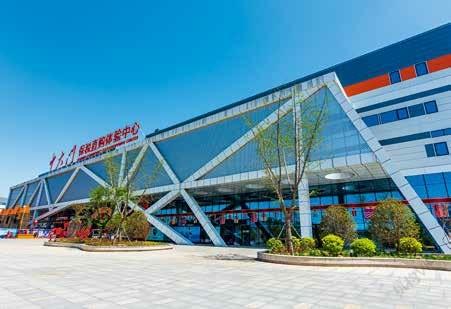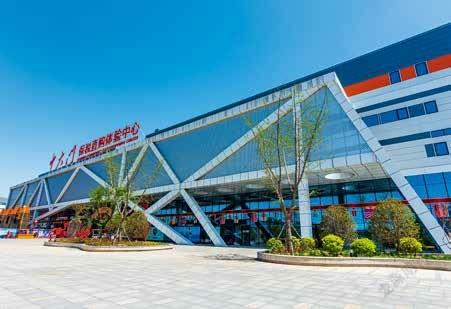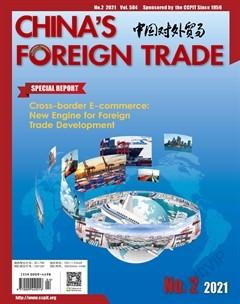Building A Bridge for Foreign Trade on the Cloud
By Lily Wang


The first China Cross-Bor- der E-commerce Trade Fair, which lasted for 3 days, came to an end at the Fuzhou Straits International Convention and Exhibition Center. As a large-scaled national exhibition, the event attracted the participation of 33 global mainstream cross-border e-commerce platforms, 230 renowned cross-border e-commerce service suppliers, and 2,363 companies from 22 provinces and cities in China. Approximately 62,000 customers in the cross-border e-commerce sector attended this event, and the total passenger flow reached 130,000. The achievements of this event far exceeded expectations.
During the exhibition, the 72,000 sq. m. exhibition hall was crowded with participants. Customers were seen waiting in corridors or in front of exhibition stands at each of the 13 exhibition sections. Foreign trade transactions, which have been suppressed by the pandemic for a long time, saw robust growth. Many business negotiations heated up at the venue. According to an on-site survey, suppliers said the transaction volume far exceeded their expectations. Approximately 25% of suppliers set new on-site sales records, and 80% of suppliers received orders of intent, inquiries or invitations for further business discussions. Approximately 90% of exhibitors signed agreements for next years exhibition stands and hoped to expand the scale of their presence at the exhibition. According to estimates, the total transaction volume during the three day exhibition surpassed USD 3.5 billion.
“Silk road e-commerce”is gradually becoming the shining point for Belt and Road cooperation
The Belt and Road region has always been the key area for Chinas cross-border e-commerce business cooperation.
The 2021 Silk Road E-commerce International Cooperation Forum was also recently held. Zhu Lian, an official from the E-commerce and Information Department of the Ministry of Commerce, said that over the past year, China has been working with partner countries on “silk road e-commerce” to cope with the global challenges posed by the COVID-19 pandemic, and have expanded the scope and contents of such cooperation through mutual assistance.
Many officials working in foreign embassies in China said that although the pandemic has brought about challenges in terms of the flow of people, products and resources across the world, “silk road e-commerce”has provided new opportunities for increasing communication, reducing costs and enhancing the trade flow among different countries. It has become a shining point for the promotion of Belt and Road cooperation.
“The people of Iceland love online shopping. E-commerce has developed strongly there, and peoples passion for shopping on Chinas e-commerce platforms cannot be stopped,”explained the Icelandic Embassys Deputy Director Han Weilian. He then went on to say that since the signing of cooperation agreements with Chinas e-commerce platforms, bilateral e-commerce grew rapidly, which provided new channels for the prosperity of trade.
Colombias Ambassador to China Luis Diego Monsalve repeated the idea that the COVID-19 pandemic has created a huge challenge for the global economy, and emphasized that it is important to use new technology to stimulate economic growth. At present, more than 21% of Colombian people are accustomed to shopping online and more than 30% of companies in Colombia sell their products through the internet. Colombia intends to work more closely with China in the e-commerce business in the future.
Gabonese Ambassador to China Baudelaire Ndong Ella explained that in Gabon, approximately 50% of people have access to the internet and that the proportion of online shopping is continually grow. Gabon is willing to work with China to enhance cross-border e-commerce trade, so as to make Gabon one of the most important e-commerce platforms in Africa.
Indonesian Ambassador to China Djauhari Oratmangun is also very optimistic about future cooperation between China and Indonesia in terms of “silk road e-commerce”. He said that Indonesia will work more closely with China in the global digital economy to bring more benefits to ASEAN countries. ASEAN countries will also further increase their cooperation with China.
At present, China has established bilateral e-commerce cooperation mechanisms with 22 countries on five continents. Zhu Lian said that in the first year of the period of the 14th Five-Year Plan, the Ministry of Commerce will continue to promote“silk road e-commerce”, share developmental benefits with partner countries and inject new momentum into the global economic recovery. It is expected that more e-commerce companies will expand their overseas business, introduce premium products and propel industrial development.
Zhu Lian hopes that Fujian and other provinces and cities are able to play to their distinct advantages in terms of regional industries and to actively engage in “silk road e-commerce” cooperation, in order to develop new sectors and channels and promote the high-quality development of “silk road e-commerce”.
As part of the core region of“21st Century Maritime Silk Road”, Fujian Province will accelerate its construction of “silk road e-commerce”. Lin Baojin, Fuzhou CPC Secretary, said that in recent years, Fujian has been integrated into the new development layout featuring domestic circulation as the mainstay, with domestic and international circulations promoting one another. It plays to its multiple regional strengths to improve the business environment and has currently become Chinas fastest-growing e-commerce trade center. Fuzhou will take advantage of the opportunity to be approved as a cross-border e-commerce comprehensive experiment zone to develop industry clusters of crossborder e-commerce and cover all business models of cross-border e-commerce. The purpose of this is to attract more flagship companies to invest in this business.
Promoting digital upgrading of traditional foreign trade
The recent “Two Sessions”approved the 14th Five-Year Plan(2021-2025) for National Economic and Social Development and the Long-Range Objectives Through the Year 2035, which clearly includes support for cross-border e-commerce. Lin Zhenmin, Deputy Governor of the Bank of Chinas Fujian Branch, said that as a commercial bank, the Bank of China will follow these policy measures to formulate financial service solutions. “Regarding services for e-commerce platforms, we are focusing on ‘e-commerce platformsand introducing supply chain finance models to solve financing difficulties and the problem of lack of guarantees for platform customers, especially small customers. The bank will also use block chain technology to integrate information and data about customs, taxation and logistics, so as to change the way that trade transaction are dealt with and create more tradetransaction products. The purpose of this is to meet the financial needs of cross-border e-commerce through automatic, digital and informationbased tools. Third, the cross-border e-commerce development will accelerate the digital transition of commercial banks. The bank will further enhance its product design, policy making, innovation services and foreign exchange settlement facilitation, in order to better meet the financial needs of the cross-border e-commerce industry.”
Mobile cross-border e-commerce platform Wish was also invited to the exhibition. It is known that Wish has more than 100 million active users on average each month. Even during the peak of the pandemic in 2020, Wishs development never stopped. Ivy Chen, representative for Wishs Chinese business, said, “Wish is committed to helping Chinese brands go overseas. We have been tapping into supply chain resources to help more Chinese brands and factories explore the global market. Wish has been enhancing its platform image through the flow of multiple channels, professional operational services and distinct brand levels. It also provides strong support for the sales of Chinese brands.”
As a subsidiary of Zongteng Group, YunExpress is a leading crossborder B2C logistics service provider. It features four business sections, including B2C commercial lines, air mail, international express deliveries,and FBA first-leg delivery, to provide small package logistics services for Chinas cross-border e-commerce companies.
Regarding the bottleneck problems faced by cross-border e-commerce, Zongteng Groups vice president Li Cong said, “on the one hand, the pandemic has accelerated the shift in consumption scenarios towards the internet, which has produced more orders for e-commerce operators. This trend will continue and we are optimistic about the market in 2021.On the other hand, some countries and regions are still in the midst of a serious pandemic situation and transportation is still blocked. Cross-border e-commerce sellers must try to manage risks, reduce the turnover of goods, and choose logistics services with direct lines to destination countries.”
Hustle and bustle at the venue
People were able to see the best products from all over the country at the exhibition venue. Standout products included pencils produced in Zhejiangs Qingyuan, electric toothbrushes produced in Ningbo, clocks produced in Zhangzhou and woven crafts produced in Minhou.
The high popularity of the event reflects the strong momentum of cross-border e-commerce and the endeavors of the whole industry to seek out commercial businesses.
Pencil producers in Qingyuan hope to expand their overseas sales channels by participating in the exhibition.
“It is beyond our expectations; we havent seen such large crowds of people since the pandemic broke out. Our business managers were too busy to have a break at the exhibition area. Customers have come from all over the country, and you can see the strong influence of Fuzhuos crossborder e-commerce,” said He Gaohua, a representative for eBays exhibition area.
“The COVID-19 pandemic has had a huge impact on the foreign trade business. It has also brought about new opportunities for the crossborder e-commerce industry,” said Deng Hai, a representative of the organizing committee of the Fair.
A furniture producer in Quanzhou transitioned into a crossborder e-commerce company in 2020, and its annual sales neared RMB 1 billion. However, one year ago, this company relied on traditional trade.“Last year, due to the impact of the pandemic, we started trying to engage in cross-border e-commerce. One of our computer desk products became a best-selling product due to the trend of working from home in foreign countries,” explaineda representative from Fujian Jiashibi Technology Co., Ltd., before continuing to say that besides production, the factory is now using OEM business to support 137 small- and medium-sized companies at the supply side.
Minxing Woven Product Company of Minhou has also benefitted from the cross-border e-commerce business. As a key supplier, the company attended the exhibition. “Despite the impact of the pandemic, our companys sales through cross-border e-commerce surpassed RMB 12 million last year, and the profits from this doubled that of traditional sales. The companys exports have also finally stopped sliding,” said a spokesperson for the company.
Liang Yong, Deputy Director of the Fuzhou District Management Commission of the Fujian Free Trade Experiment Zone said, “the Fair will be permanently located in Fuzhou and will provide long-term support for crossborder e-commerce development. It will also stimulate the digital economy, exhibition economy and foreign trade business of Fuzhou.”
- China’s foreign Trade的其它文章
- Chinese Elements Highlight the Charms of Fashion
- Post-epidemic Demand for Talent Illustrates New Trend
- The Number of Overseas Students Returning to China Has Doubled
- Insight into the Trends in Chinese Enterprises Affected by the Pandemic
- China and Thailand Discuss Innovative Investment Online
- Feet Firmly on the Gas Pedal in GBA

